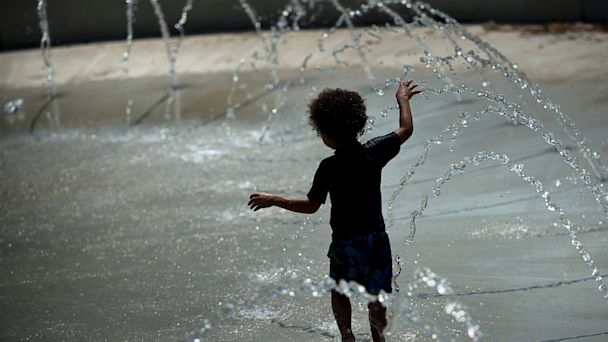Heat Wave Triggers 'Hyperthermia Alert'

A fountain at Wheatley Recreation Center, July 1, 2012, in Washington. (Credit: Brendan Smialowski/AFP/Getty Images)
The smoldering heat slamming the Northeast has triggered a hyperthermia alert in Washington, D.C., where residents are being urged to find air-conditioning and drink plenty of water.
The alert, issued just before noon today, was triggered by a 96-degree heat index, a measure of heat and humidity. And it's only getting worse, according to the National Oceanic and Atmospheric Administration, which predicts afternoon heat indices in the 100s through the week.
"The alert is issued for homeless people, senior citizens and other vulnerable populations who may not have access to air-conditioning," a spokeswoman for D.C.'s Department of Human Services said, noting that the term "hyperthermia alert" has been used by the government for at least 20 years.
Hyperthermia is an abnormally high body temperature, an imbalance that can cause dizziness, disorientation and, in severe cases, death. The most common forms are heat exhaustion and heat stroke, the latter of which occurs when the body is "overwhelmed by heat" and unable to control its temperature, according to the National Institutes of Health
Symptoms of heat stroke include dry, flushed skin, a sign that the body is no longer cooling itself through sweat. People with heat stroke might also feel faint and confused, according to the NIH.
"Seek immediate emergency medical attention for a person with any of these symptoms, especially an older adult," the agency says on its website.
Other signs of heat-related illness include:
- Nausea, cramping or vomiting
- Bizarre behavior, including combativeness
- Lethargy or loss of consciousness
- Staggering or convulsions
Older people are more at risk for heat-related illness because of changes to the skin and circulatory system that come with age as well as health problems and medications that interfere with the body's ability to sweat, according to the NIH.
D.C. health officials are advising residents to stay cool and hydrated, recommending cold showers or baths for those in need of fast relief. They're also urging neighbors to check in on one another.
The Department of Human Services has set up emergency shelters and cooling centers for the homeless and a Hyperthermia Hotline, operated by United Planning Organization, for anyone who sees a homeless person in need of medical attention.
If you think someone might be suffering from a heat-related illness, the NIH recommends:
- Getting the person into a cooled or shaded place
- Applying a cool, wet cloth to the wrists, neck, armpits or groin
- Encouraging the person to cool off with a shower or a drink if they can stand and swallow safely
- If you suspect heat stroke, call 911
Click here for more information about the signs of hyperthermia and how to help someone in need. And stay cool!